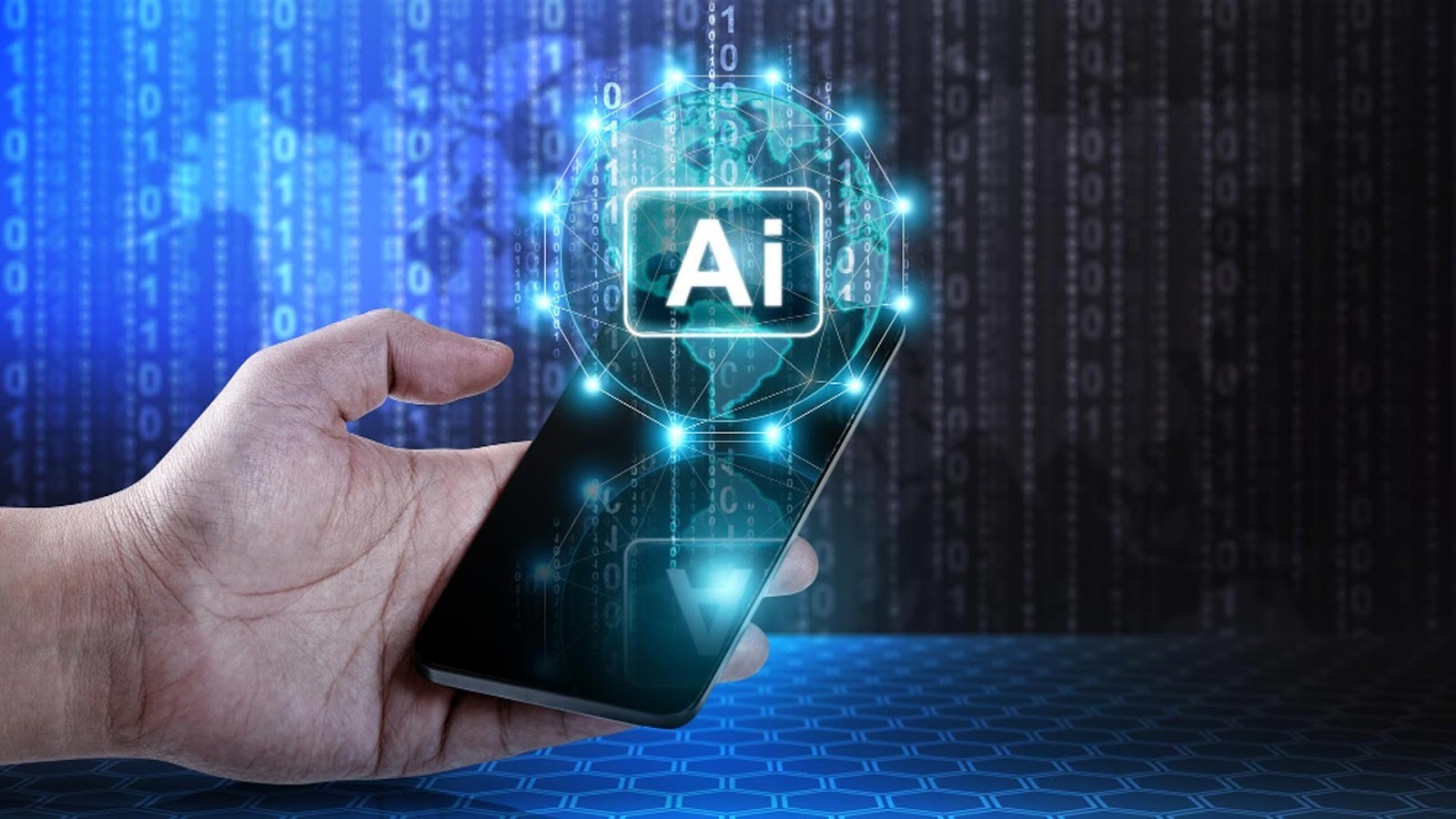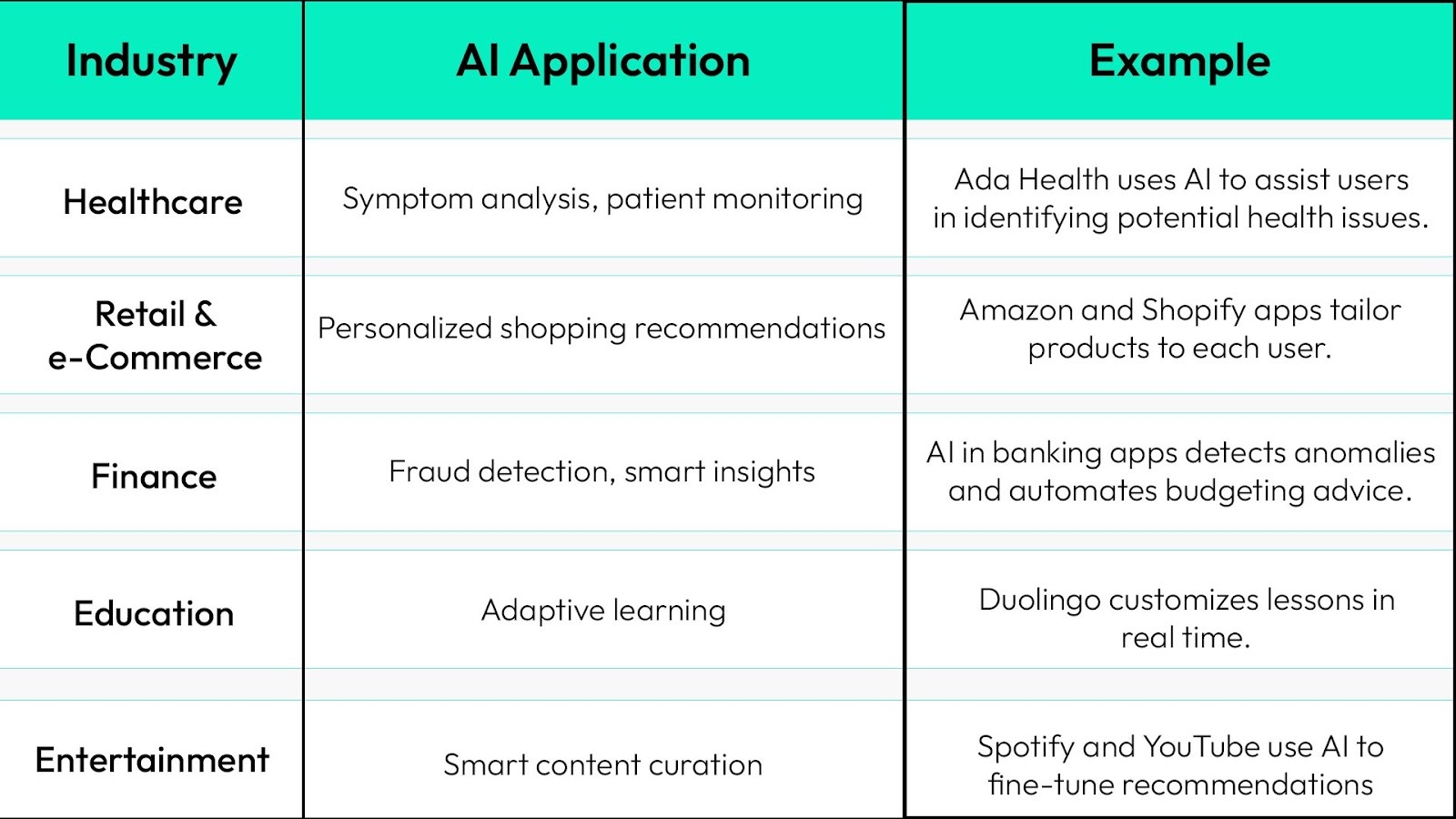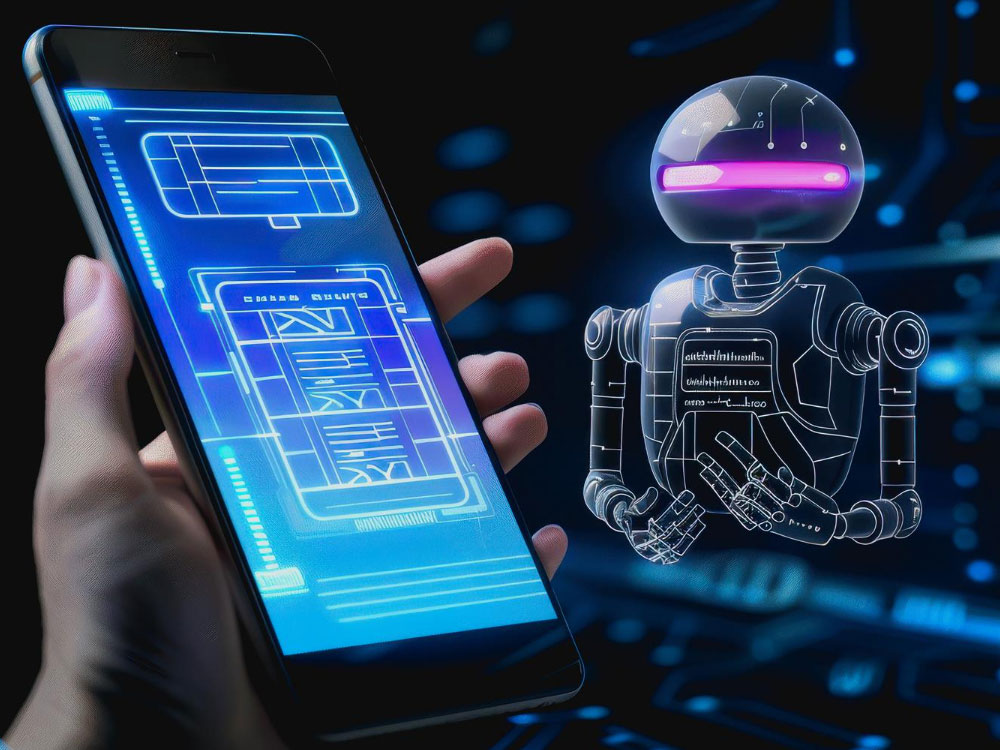Mobile apps in the digital first world are not merely tools. It is now seamless, fast, and interactive interactions on your mobile device powered by Artificial Intelligence (AI), whether it is a personalized playlist on Spotify, predictive ordering on coffee apps, and more.
This move is transforming the understanding of what it means to have a good app design to both businesses and developers. An application can no longer be just pretty on the outside, it needs to learn, change and be customized.
That is where AI in mobile application development is.
What Is AI in Mobile App Development?
Mobile app development with AI implies the incorporation of the artificial intelligence technologies, including machine learning (ML), natural language processing (NLP), and computer vision, into the mobile applications.
AI-driven apps change over time instead of reacting to the fixed inputs. They are able to identify speech, interpret images, analyze habits and provide dynamic experiences, which get more intelligent with use.
Think of how:
- Netflix recommends shows based on your watch history
- Duolingo adjusts lessons according to your learning pace
- Google Maps predicts your likely destinations
Each of these features relies on AI models that process real-time data to create seamless and personalized experiences

Why AI Matters in Mobile App Development
Mobile apps are becoming an integral aspect of almost all aspects of daily life since there are more than 6.3 billion smartphone users around the world. However, users too have become choosier, they want not only fast, but also personalized and intuitive experiences.
AI enables developers to meet those expectations.
It allows apps to:
- Understand and predict user preferences
- Deliver personalized content and recommendations
- Automate repetitive tasks
- Improve performance and security
For businesses, that translates to higher user satisfaction, stronger retention, and measurable ROI.
How Custom Mobile App Development Companies Use AI
The companies that are on the forefront in applying AI in mobile ecosystems are custom app development companies. They deploy AI as an extension but not as a background of app intelligence. Here how
1. Delivering Personalized User Experiences
Through AI, apps can learn the user behavior in real-time based on clicks and scrolling behavior to purchase history and content preferences.
This information drives recommendation engines which are tailored to an individual user. Personalization with the help of AI can reinforce engagement and conversion because it can be an eCommerce app that recommends goods, or a news app that filters stories.
2. Using Predictive Analytics to Anticipate Needs
AI turns data into foresight. Mobile applications may predict what the user wants by using predictive analytics.
Fit apps can suggest a workout even before you decide to have one. A travel application could be able to recommend destinations depending on past search.
This proactive experience also ensures that the users are kept entertained and the businesses remain one step ahead.
3. Enabling Human-Like Interactions with Conversational AI
Chatbots and voice assistants powered by AI have transformed customer service and experience.
With NLP, the systems can understand the tone, context, and intentions and the apps can talk to the users in a natural manner.
It means that they give immediate feedback, offer user instructions, and constantly evolve through learning every interaction gaining more accuracy as time goes by.
To businesses, it translates to 24/7 smart customer service without the need to acquire more personnel.
4. Strengthening Security with AI
One of the most significant issues of current-day app development is security and AI is a potent partner.
Artificial intelligence models entail detection of abnormal patterns, detection of probable fraud, and biometric authentication such as facial recognition or voice recognition.
This is not only to secure delicate data but also gives the user a more secure and easy time logging in and verifying themselves.
5. Automating Development and Testing
It is not only changing the user experience, but AI is changing the way apps are designed.
The tools are AI-based and are beneficial in assisting developers to create code, identify bugs, and perform automatic tests.
Forecasting possible problems prior to implementation, AI increases the development time reduced and enhances code stability leading to quicker releases and more functional apps.
6. Enhancing Offline Functionality with Edge AI
Edge AI enables applications to handle data without relying on the cloud and do this on the device.
This enhances speed, privacy, and offline performance that is vital to the users in areas with fluctuating internet connections.
Applications, such as photo-editing ones, can now use AI filters without uploading pictures to the Internet.
Real-World Applications of AI in Mobile Apps

How to Build an AI-Powered Mobile App
To develop an AI-driven mobile app, developers, data scientists, and designers need to work together and plan. The most common process used by most custom mobile app development companies is as simplified as follows:
- Define a Clear Objective
Identify the problem AI should solve — personalization, automation, or prediction. - Collect Quality Data
AI models learn from data, so accuracy depends on how clean and relevant your datasets are. - Choose the Right AI Tools
Frameworks like TensorFlow, PyTorch, or OpenAI APIs support advanced AI model integration. - Integrate AI Early in Development
Plan AI architecture at the design stage — not as an afterthought. This ensures smooth performance and scalability. - Test and Iterate Continuously
Gather user feedback, retrain models, and refine features based on behavior insights.

Best Practices for AI-Driven App Development
To make your AI app truly effective:
- Focus on solving a real user problem, not just adding AI for buzz.
- Prioritize data privacy and transparency — users need to trust your AI.
- Start small, test fast, and scale features gradually.
- Encourage collaboration between your business, design, and tech teams.
The Future of AI in Mobile Apps
The next generation of apps will be built around intelligence, emotion, and creativity.
Here’s what’s next for AI in mobile app development:
- Generative AI will create real-time images, videos, and content.
- Emotion recognition will allow apps to sense and respond to user moods.
- Edge AI will make apps faster and more private by processing data locally.
- Hyper-personalization will deliver context-aware user journeys across devices.
This change is already being pioneered by custom mobile app development companies - the creation of apps that not only think, learn, and evolve with their users, but also have the ability to do so.
Conclusion
AI has ceased being a nice-to-have feature, and now it is an indispensable basis of successful mobile app development.
It makes the user experience better, increases its security, automates workflow, and makes apps bring value in real time. To the businesses the AI does not just optimize the operations of the business it forges closer and more significant relationships with the users.
Collaboration with a well-established company that specializes in AI and creating individual mobile apps guarantees that your product becomes the latest structure and at the same time does not deviate off course.
Intelligent apps do not only work at the end of the day but also listen and learn and interact.
.png)








